Have you experienced a different culture that made you think differently or effected you?
I admit I didn’t know a great deal about Japan. My recent trip there filled me with respect for a foreign country whose history, architecture, religion, language, culture, and food differ greatly from my experiences or travel. I discovered that the country is 35% Buddhist, 25% Shinto, and 1% Christian.
Our guide told us that the Japanese blend the first two religions. She explained that Buddhism is about understanding that “Life is tough, and one should roll with it.” Therefore, a good majority will go to a Buddhist priest for funerals.
“I have told you these things so that in me you may have peace. In this world, you will have trouble. But take heart! I have overcome the world.” John 16:33.
Shintoism, the indigenous religion of Japan, is the worship of nature and ancestors. It involves various rituals and ceremonies, such as purification rites before entering a shrine and offering prayers and symbolic items to the kami (spirits or gods). Weddings, births, and New Year’s Day are celebrated at Shinto shrines, where these practices are observed. Unlike Buddhists, Shintos are not vegetarians and do enjoy alcohol, with sake being a favorite.
The Japanese people we met seemed to have a calm and optimistic presence. When we saw some turtles bopping their heads up, our guide at a lake we visited said, “That is a gift to you. We don’t always see them.” It wasn’t a line from a guide…She further explained, with a kindness glowing from her face, “It’s about opening our eyes to simple things and being grateful.”
As a Type A person, I was struck by the contrast between my personality at times and the serene ambiance of the Tea Gardens. The tranquility was palpable as I meandered among the blossoming cherry trees, the graceful bamboo, and the majestic ginkgo trees. Shintoism’s influence emphasizes finding the divine in nature, which is sacred and precious in Japanese culture.
The wilderness and the dry land shall be glad; the desert shall rejoice and blossom; like the crocus, it shall blossom abundantly and rejoice with joy and singing. They shall see the glory of the LORD, the majesty of our God. Isaiah 35:1-2.
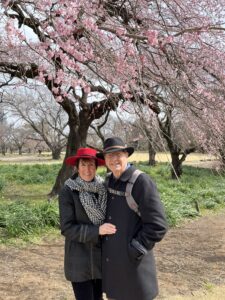 This is shown through the deep reverence for the cherry blossom, Japan’s national flower. The brief blooming season (seven to ten days) brings a sense of holiday, with families enjoying picnics under the blossoms. They call it Hanami, which means flower viewing. Cherry blossoms are so integral to the Japanese that they have a saying to tell children about their test status and whether the child graduated. “If the cherry blossom bloomed (they passed their tests, so they graduated) or if it has fallen (they didn’t). The Shoguns (Presidents) and samurai didn’t allow cherry trees to be planted in their castles, for it reminded them of how short life is and how they are called at any time to give up their lives,
This is shown through the deep reverence for the cherry blossom, Japan’s national flower. The brief blooming season (seven to ten days) brings a sense of holiday, with families enjoying picnics under the blossoms. They call it Hanami, which means flower viewing. Cherry blossoms are so integral to the Japanese that they have a saying to tell children about their test status and whether the child graduated. “If the cherry blossom bloomed (they passed their tests, so they graduated) or if it has fallen (they didn’t). The Shoguns (Presidents) and samurai didn’t allow cherry trees to be planted in their castles, for it reminded them of how short life is and how they are called at any time to give up their lives,
Hanami represents a time of renewal and optimism and symbolizes the impermanence of life, a major theme in Buddhism. It reminded me of how we need to be present and appreciate every day God has given us.
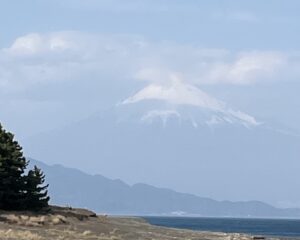 We were lucky enough to witness another great symbol of Japan—Mount Fuji. Thanks to its towering height and the surrounding clouds, it’s only visible 47 to 76 days a year. Seeing it on Easter added a layer of significance to the experience. On our last day in Japan, in the morning, Mt Fuji was hidden, but after attending Easter service, the clouds parted, revealing the majestic mountain. It was a stunning parting gift.
We were lucky enough to witness another great symbol of Japan—Mount Fuji. Thanks to its towering height and the surrounding clouds, it’s only visible 47 to 76 days a year. Seeing it on Easter added a layer of significance to the experience. On our last day in Japan, in the morning, Mt Fuji was hidden, but after attending Easter service, the clouds parted, revealing the majestic mountain. It was a stunning parting gift.
I wouldn’t say the Japanese are reserved but serene and respectful. Respect is an integral part of their culture and is demonstrated through a bow in greetings and conversations. A small bow is given to strangers, a deeper bow to colleagues and friends, and the deepest bow is given to a boss or someone in authority. Could we imagine always showing respect to anyone, whether we agree with them or not? Even if it is to agree to disagree.
Before the mountains were born or you brought forth the whole world, you are God from everlasting to everlasting. Psalm 90:3.
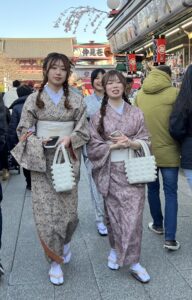 The Japanese are taught at a very young age to respect their neighbors and communities by keeping things clean. There is no graffiti anywhere, no garbage, and no garbage cans. People bring a bag to carry their refuse home. Every car and truck on the road is clean. The public toilets are spotless and have heated seats, music that plays as you enter a stall, and a baby holder in the corner.
The Japanese are taught at a very young age to respect their neighbors and communities by keeping things clean. There is no graffiti anywhere, no garbage, and no garbage cans. People bring a bag to carry their refuse home. Every car and truck on the road is clean. The public toilets are spotless and have heated seats, music that plays as you enter a stall, and a baby holder in the corner.
Can we learn things from different cultures/religions?
I relate to seeking the Divine in nature. I marvel and revere God’s amazing creativity and am so grateful I have eyes to see. I appreciated the people’s calm, serene, and accepting attitude toward life situations. It reminded me of God’s assurance in the many verses, not to worry that God is with us through every phase of life. It was moving to see how polite people can be. It was refreshing to see how clean a city can be because of the respect given to one another. Reminding me, Romans 12:18.
“If it is possible, as much as it depends on you, live peaceably with all people.”
Travel expands your mind and heart, even to a different part of your town or state.
Have you had an experience with a different culture from which you learned something that affected you?
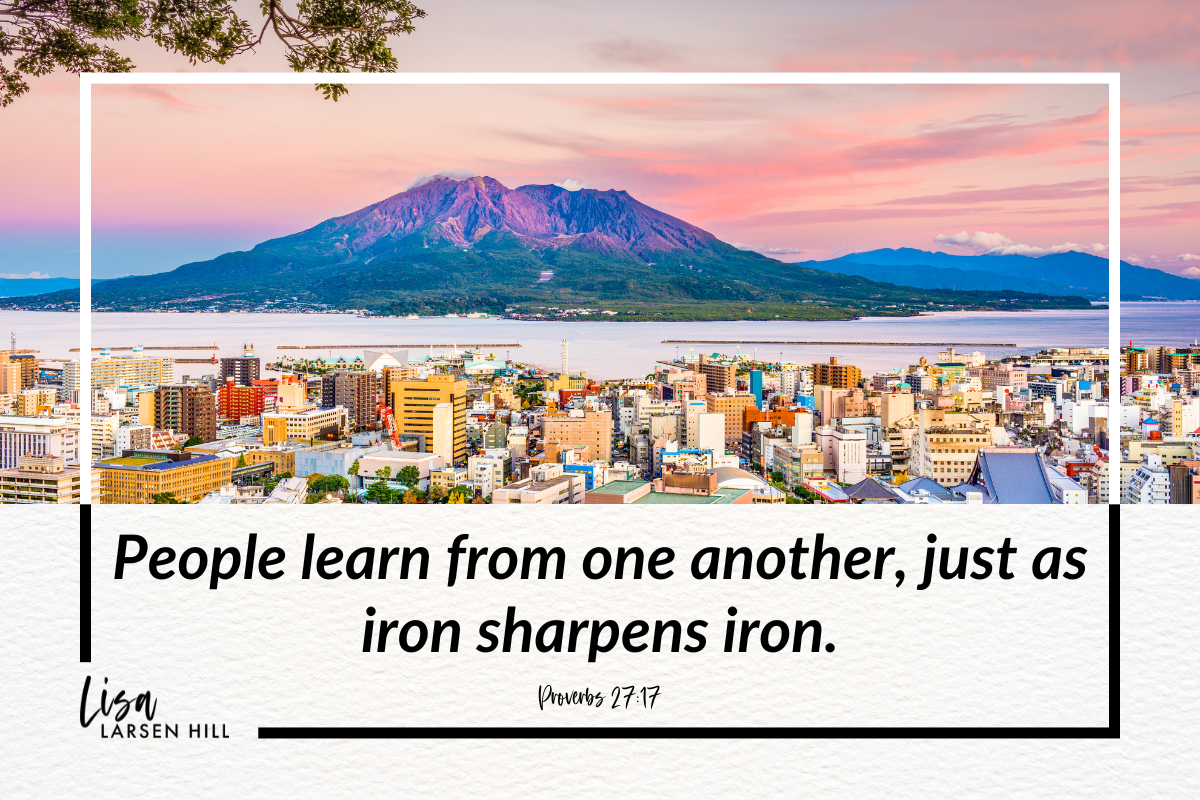


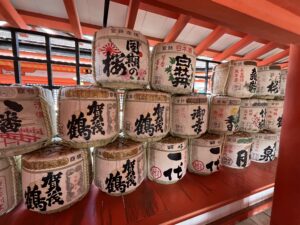


The Conversation
The photos are lovely! Reading about Shintoism reminds me Franciscan theology which holds that the entire created universe is the body of Christ. As this past Sunday was Creation Sunday, your post is even more relevant. The cleanliness, peacefulness and respect are qualities I can be mindful of today. Thank you for sharing your experience.
Thanks, Shelia, for your comments and for reminding us of Creation Sunday!Peace.
Thanks for this great post, Lisa! It really sounds amazing, and the photos are wonderful. And, a good lesson, to learn from other cultures.
Thanks so much, Stephanie! I appreciate your kind comments!